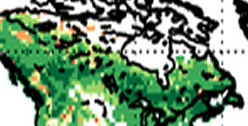By Ken Gregory P.Eng. July 17, 2023
A recent paper provided estimates of carbon sinks in North America. The authors used an ensemble of 19 state-of-the-art dynamic global vegetation models to improve carbon sink estimates and study the drivers of its variability. Carbon sinks refers to the net absorption by the land of carbon dioxide (CO2). The study reports that the carbon sink of North America increased from 1,140 megatonnes (Mt)CO2/yr during 2000-2009 to 1,610 MtCO2/yr during 2010-2019. Vegetation absorbed 57% of the CO2 causing a greening of the continent and 30% was absorbed by the soil and 13% by litter.
In Canada, the carbon sink increased from 550 MtCO2/yr during 2000-2009 to 730 MtCO2/yr during 2010-2019. These values are net of emissions by land use changes. During the same period, Canada’s average annual emissions of greenhouse gases (GHG) were 724 MtCO2eq and 716 MtCO2eq while emissions of CO2 were 571 MTCO2 during both periods. The GHG emissions include CO2, methane, nitrous oxide and four other minor greenhouse gases. GHG emissions are reported in carbon dioxide equivalents (CO2eq) using global warming potential factors. The table below shows the CO2 and GHG emissions, CO2 sinks and the net emissions.
|
Period
|
CO2 emissions
|
GHG emissions
|
CO2 sinks
|
CO2 net emissions
|
GHG net emissions
|
|
|
MtCO2
|
MtCO2eq
|
MtCO2
|
MtCO2
|
MtCO2eq
|
|
2000-2009
|
571
|
724
|
-550
|
21
|
174
|
|
2010-2019
|
571
|
716
|
-730
|
-159
|
-14
|
|
2021
|
546
|
670
|
|
|
|
The calculations show that Canada’s emissions have been declining despite our rapidly increasing population while the absorption of CO2 into land sinks have increase by 33% between the two decades. Canada’s boreal and temperate forests account for 88% of its land sinks. The increasing absorption of CO2 is causing an increase of Canada’s gross primary productivity suggesting a strong CO2 fertilization effect on photosynthesis. During the 2010-2019 decade, Canada’s net CO2 emissions were -159 MtCO2 and the net GHG net emissions were -14 MTCO2eq. The author wrote that across Canada “we found a persistent and positive effect of climate across both decades” due to increasing temperatures. While there is large uncertainty in the CO2 sink estimates, Canada has likely already surpassed net zero GHG emissions.
Why is Canada not accounting for the net CO2 sinks of our forests? Why are we planning to spend over $130 billion per year to reach net zero when we are already below net zero emissions including our land CO2 sinks?
------------------------------------
This article first appeared in the June 2023 FoSS Membership Quarterly Newsletter No. 78.
